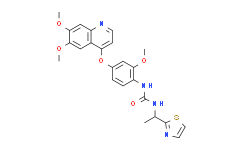| Cas No.: | 623142-96-1 |
| Chemical Name: | 1-(4-((6,7-Dimethoxyquinolin-4-yl)oxy)-2-methoxyphenyl)-3-(1-(thiazol-2-yl)ethyl)urea |
| Synonyms: | N-[4-[(6,7-Dimethoxy-4-quinolinyl)oxy]-2-methoxyphenyl]-N'-[1-(2-thiazolyl)ethyl]urea;Ki20227;1-(4-((6,7-Dimethoxyquinolin-4-yl)oxy)-2-methoxyphenyl)-3-(1-(thiazol-2-yl)ethyl)urea;1-[4-(6,7-dimethoxyquinolin-4-yl)oxy-2-methoxyphenyl]-3-[1-(1,3-thiazol-2-yl)ethyl]urea;Ki20227 (+/-);HMS3244K11;HMS3244K12;HMS3244L11;Ki-20227;Ki 20227;Ki20227(+/-);1-(4-(6,7-dimethoxyquinolin-4-yloxy)-2-methoxyphenyl)-3-(1-(thiazol-2-yl)ethyl)urea;PubChem22465;GTPL5690;SYN1049;SHPFDGWALWEPGS-UHFFFAOYSA-N;BCP01956;RS0040;BDBM50355494;ABP000277;A |
| SMILES: | S1C([H])=C([H])N=C1C([H])(C([H])([H])[H])N([H])C(N([H])C1C([H])=C([H])C(=C([H])C=1OC([H])([H])[H])OC1C([H])=C([H])N=C2C([H])=C(C(=C([H])C=12)OC([H])([H])[H])OC([H])([H])[H])=O |
| Formula: | C24H24N4O5S |
| M.Wt: | 480.5362 |
| Sotrage: | 2 years -20°C Powder, 2 weeks 4°C in DMSO, 6 months -80°C in DMSO |
| Description: | Ki-20227 is a highly selective c-Fms tyrosine kinase(CSF1R) inhibitor with IC50 value of 2 nM; 6 fold and > 100 fold selectivity over VEGFR2(IC50=12 nM) and c-Kit/PDGFRβ(IC50=451/217 nM), respectively.IC50 value: Target: CSF1Rin vitro: Ki20227 did not inhibit other kinases tested, such as fms-like tyrosine kinase-3, epidermal growth factor receptor, or c-Src (c-src proto-oncogene product). Ki20227 was also found to inhibit the M-CSF-dependent growth of M-NFS-60 cells but not the M-CSF-independent growth of A375 human melanoma cells in vitro [1]. Ki20227 inhibited M-CSF-dependent reactions, such as lipopolysaccharide-induced tumor necrosis factor-alpha production, which were enhanced by M-CSF in vitro [2]. in vivo: Ki20227 decreased the number of tartrate-resistant acid phosphatase-positive osteoclast-like cells on bone surfaces in ovariectomized (ovx) rats [1]. In addition, the number of CD11b(+), Gr-1(+), and Ly-6G(+) cells in the spleen decreased in the Ki20227-treated mice, and the CII-induced cytokine production in splenocytes isolated from the Ki20227-treated arthritic mice was also reduced [2]. Ki20227 treatments inhibited the turn-over/expansion of myeloid cells provoked by the immunization and subsequent MOG-specific T cell responses in our EAE animal model [3]. |

 DC Chemicals' products qualify for U.S. tariff exemptions. We guarantee no price increases due to customs duties and maintain stable supply, continuing to deliver reliable research solutions to our American clients.
DC Chemicals' products qualify for U.S. tariff exemptions. We guarantee no price increases due to customs duties and maintain stable supply, continuing to deliver reliable research solutions to our American clients.





















